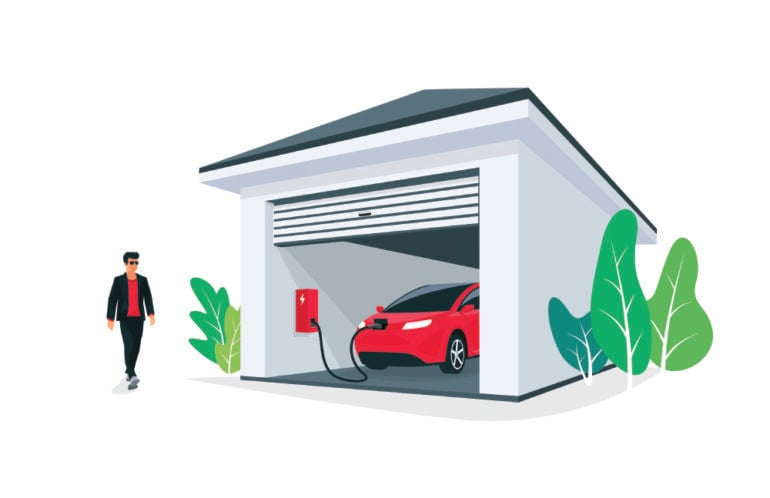Installing an EV charger at home comes with lots of benefits. Home chargers are not just more convenient than public charging stations, they also save you money, you can control them from your smartphone, your batteries will last longer, and they can even increase the value of your property.
Electric cars are becoming more popular every year, but the public charging infrastructure is still being built. Since public chargers are still hard to find compared to gas stations, the majority of EV charging will need to be done at home for the foreseeable future.
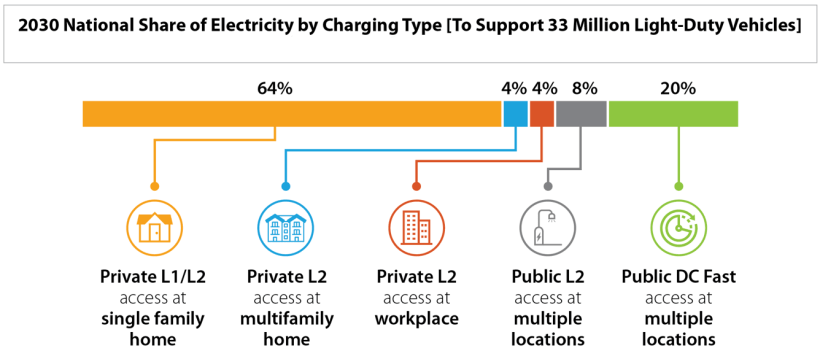
If you’re thinking about installing an EV charger at home, HelloTech can send someone to provide a free in-home estimate. Our electricians will check your circuit breaker, assess the proposed installation location, and answer any EV charging questions you have – all for free.
Benefit 1: Charging at Home is More Convenient
Installing an EV charger at home makes life a lot easier. Imagine you pull into the driveway, plug your electric car into your charger, and you’re done. When you wake up in the morning, your electric car will be fully charged and ready to go. It’s almost like having a gas pump in your garage (minus the fumes).
A “level 2” EV charger provides enough power to completely fill up your batteries in 4-10 hours, so you won’t need to use public charging stations unless you’re taking a long road trip. Having an EV charger at home will save you a lot of time driving to charging stations, waiting in line, and sitting around until your batteries fill up.
Read More: How long does it take to charge an electric car?
Benefit 2: Smartphone Apps Give You More Control
There are lots of different types of chargers you can install at home, but the best ones can be controlled from your smartphone. As long as your EV charger can connect to WiFi, you can use an app to control its power output, create custom charging schedules, and monitor your electric car’s energy use in real time.
Read More: How to choose the right EV charger
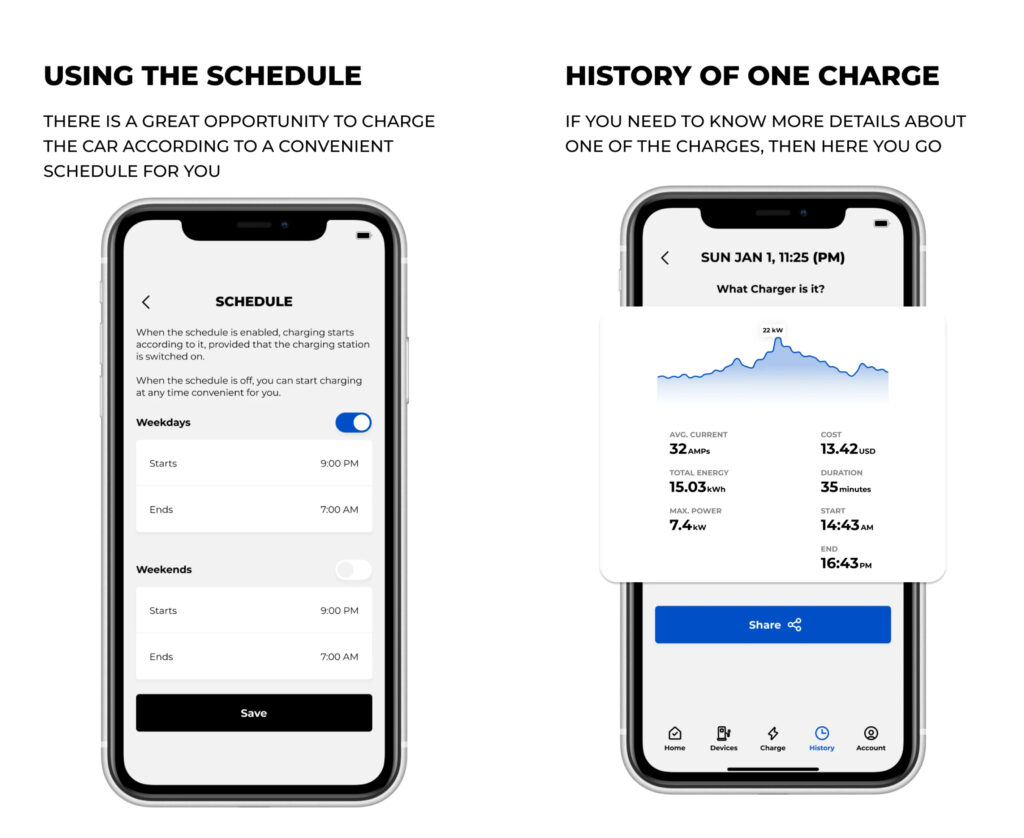
Benefit 3: Charging at Home Saves Money
Charging your EV at home is almost always cheaper than using public charging stations. According to the Bureau of Labor Statistics, average energy prices in the US are currently around $0.17 per kilowatt-hour (kWh). Compare that to prices at public charging stations, which usually cost around $0.30-$0.60/kWh.
If a charger lets you schedule EV charging at night, your utility company might offer “time of use” plans, which help you save a ton of money on your energy bills. You can also take advantage of federal rebates and local incentives to cover a portion of your installation and energy costs.
Read More: How much does it cost to charge an EV?
Benefit 4: Charging At Home Allows Your EV to Go Farther
Public charging stations typically slow down significantly when your batteries are 80% full. With a level 2 charger at home, you can easily fill your EV to 100% to get the maximum driving range. However, EV automakers only recommend charging your batteries to 100% capacity on certain occasions.
For example, if you are taking a long road trip, it can be a good idea to top off your batteries, so you don’t have to stop and charge as often. However, you should not charge your EV to 100% on a regular basis, or it could degrade the battery faster.
Benefit 5: Home Chargers Help Your EV Last Longer
Many EV automakers advise against using DC fast charging stations on a regular basis to prevent your battery from losing capacity. In a 2015 study, the Idaho National Laboratory found that charging an EV with only DC fast chargers does degrade the battery faster than only using level 2 “AC” chargers.
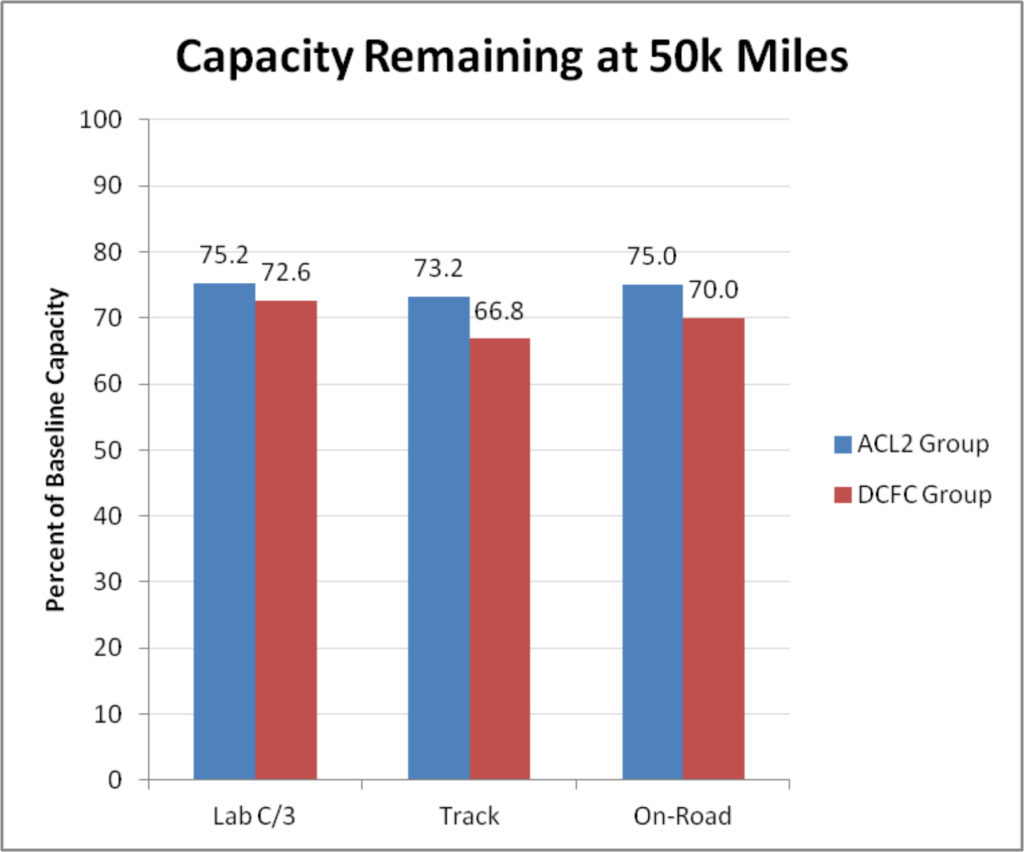
The researchers did note that the difference in degradation between the two test cars was “small in comparison to the overall capacity loss” that occurred in both cars after driving 50,000 miles. It’s also important to note that one of the major causes behind the degradation from DC fast chargers comes from the heat generated during charging, and the tests were conducted in a particularly hot climate.
In the time since those tests were conducted, EV makers have upgraded their battery management systems to handle the amount of power DC chargers supply. Now, more recent tests show “no statistically significant difference in range degradation” when using DC fast chargers vs level 2 chargers.
Benefit 6: Charging an EV at Home Is Safer
If you leave your car at a public charging station for long periods of time, there is a greater chance that someone could break in and steal your things. With an EV charger in your garage, you can leave your car plugged in all night without fear. Plus, you won’t have to worry about anyone unplugging your EV at home.
If, however, your EV charger is not installed properly, it could short circuit, cause your power to go out, or even start a fire. That’s why it’s so important to contact a licensed electrician to gather all the proper permits, install your EV charger for you, and set up an inspection when the job’s done.
Read More: Do you need a permit to install an EV charger at home?
Benefit 7: EV Chargers Increase Property Value
As electric vehicles become more popular, the demand for homes with charging stations increases. In fact, a 2023 study found that homes located near public charging stations sell for $17,212 more on average, so you can imagine how much more you could get with a charger located in your garage.
If you own an apartment or office building, installing an EV charger can also be a good way to attract new tenants. However, it will only make a difference if you install a hardwired charger or add a new 240-volt outlet. Hardwiring an EV charger means connecting it directly to an electric panel, while a 240-volt plug allows you to install a plug-in charger.
Read More: Hardwired VS plug-in EV chargers
Benefit 8: Become Energy Independent
By connecting your EV charger to solar panels, you won’t need to rely on utility companies at all. With many other ways to generate electricity from renewable energy sources in your backyard, EV chargers make it easier to go completely off-grid and even sell any excess electricity back to your utility company.
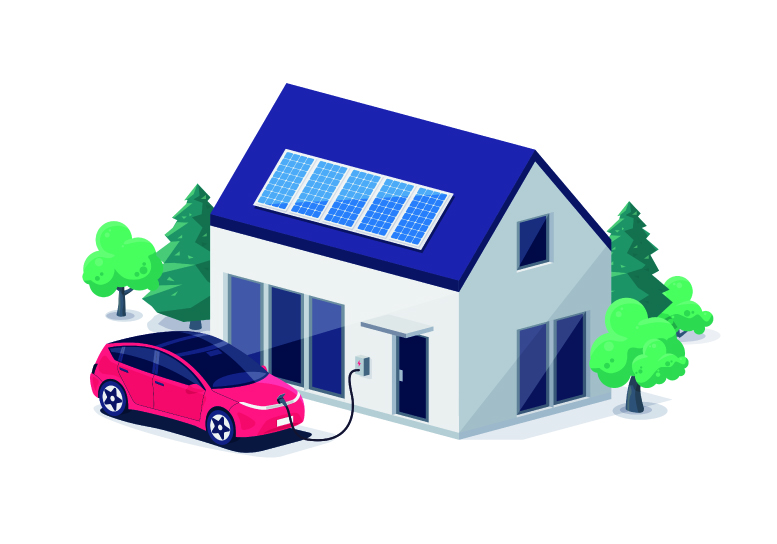
If you do plan to use solar panels or other renewable energy sources to charge your EV, it’s a good idea to also install a backup battery power station and energy monitoring systems. Currently, one of the best providers of solar EV charging systems is Emporia.
Benefit 9: Lower Your Emissions to Zero
It goes without saying that one of the biggest benefits of switching from gas-powered cars and using an EV charger is the impact they have on the environment. Electric cars don’t produce tailpipe emissions, and if you use renewable energy sources to charge your EV, you might be able to reduce your car’s total emissions to near zero.
Benefit 10: Personalize Your EV Charging
When you install an EV charger at home, you have the flexibility to choose where it goes, how much power it will use, how long the cable needs to be, and more. Basically, you can personalize your EV charging experience and fill up your batteries whenever you want.
If you need any help installing your EV charger, HelloTech can send an electrician to your door to give you a free quote. We can provide an in-home quote in as little as 15-30 minutes, and our technicians can schedule your installation within a week or two of the estimate.
